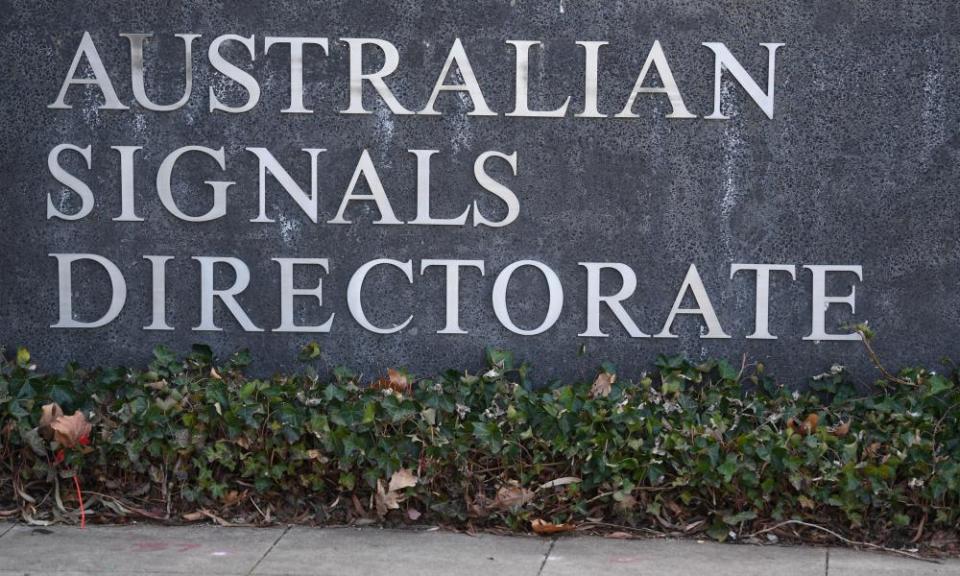Australia's spy agency has dismissed its official historian. But why?

A decision by Australia’s cyber spy agency, the Australian Signals Directorate, to change the author of its partially written official history raises questions about the organisation’s purported desire for greater transparency.
John Blaxland is a respected military historian and a former army intelligence officer. He has served Australia in, among other places, East Timor, Thailand and Washington.
He knows how the intelligence world works. And as an accomplished academic historian, he also understands sound history demands an uncompromising gaze upon documentary sources and a desire to illuminate as much as possible of what is unearthed.
Related: Cybersecurity agency insists it doesn’t want to conduct mass surveillance of Australians
The ASD apparently wanted a two-volume official history of the highest integrity. It chose Blaxland – the lead author of two controversial volumes of the official history of Asio, the Australian Security Intelligence Organisation – because the then ASD director, Mike Burgess, rightly assumed that is what Blaxland would deliver.
But recently the ASD under its new director Rachel Noble decided to cancel the contract, valued at some $2.2m, with Blaxland and his institution, the Australian National University.
It’s been pretty much silent pigeons all around since the news broke that the agency had told Blaxland that his contract would be cancelled.
Blaxland began work on the first half-completed volume mid last year and had planned to dedicate four years to the two books.
Blaxland won’t speak about what happened, referring questions to the university. The ANU, meanwhile, has put on record an anodyne, somewhat confusing explanation of the decision having been “mutually agreed by ASD and ANU” although “ultimately ... made by ASD”. For good measure it wished the ASD all the best for the project’s future.
Jolly good then.
For its part the ASD reckons it still wants an “objective high-quality account” of its history towards which “work continues”.
Clear as mud.
It’s all more than a little confusing. Not to mention mysterious. Which is kind of ironic given the aim of the official history was all about demystifying one of Australia’s most secretive – and powerful – intelligence agencies that is being relied on ever-increasingly in the fight against cyber-espionage.
But just how objective, how probing of its successes and many failures, its techniques and its ever-expanding powers, does the agency really want its official history to be?
Recently Noble spoke of the increasing importance of the ASD’s public transparency.
“... maintaining the trust of the Australian people in ASD is achieved by the government being transparent about what intelligence and security agencies are asked to do,” she said.
All well and good – should the actions of the ASD mirror its purported desire for government transparency about what its secretive agencies do.

A good place to start would be with ASD’s official history, of course. For example, why was Blaxland dismissed? And what does it mean by “objective” history?
The mystery of all of this must, by necessity, now be addressed in the ASD’s official history, by whoever is willing to assume the project in such tenuous circumstances. The fracas around Blaxland’s dismissal has been rendered part of the story now.
History can be kind of vexed like that.
The business of official history writing is thorny, as Blaxland knows too well from his experience with two of the Asio volumes. An official history of a spy agency will never please everyone. He was criticised by the right and the left for giving too much weight to opposing influences. Which may mean he did something right.
There is also the business of having such tomes vetted, line by line, in order to avoid compromising operationally sensitive material. It’s not for the quick-turnover, impatient researcher/writer.
Related: Peter Dutton confirms Australia could spy on its own citizens under cybersecurity plan
“They [Asio] didn’t remove judgements, they removed operationally sensitive material: Can that person be named? Can that operation be named? Can we mention that location? And if there were ongoing operational sensitivities, we had to pixelate that out,” Blaxland has explained.
“What we found is ... that we could work out a way of saying things without taking the story away and so in the end, the manuscript that we submitted at Top Secret came out at Unclassified with 92 per cent of the manuscript still there so that’s pretty good going.”
Announcing Blaxland as leading the ASD official history project, Burgess described him as “uniquely placed” due to his front-line insights into the Australian intelligence community and because he is “one of Australia’s most experienced and respected military historians”.
As somebody who has experienced the exhaustive process of reading tens of thousands of classified documents, negotiating critical operational issues and still emerging with two readable, incisive history volumes of a top-secret spy agency, Blaxland would appear to have been the correct choice.
His termination without any adequate public explanation as the official historian of the ASD is clearly not in the interests of truth and transparency.
It certainly smacks of control-freakery. And looks a good deal more opaque than transparent.

 Yahoo News
Yahoo News 
